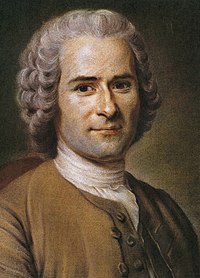Bendiktas Klimantis
President of Aucuria Bendiktas Klimantis | |
|---|---|
 | |
| In office May 1, 1792 – May 1, 1802 | |
| Preceded by | Position created tbd rename (as King) |
| Succeeded by | Juozapas Kairys |
| In office March 8, 1790 – May 1, 1792 | |
| Preceded by | Position created |
| Succeeded by | Position abolished |
| Personal details | |
| Born | Bendiktas Vergilijus Klimantis June 28, 1742 Mariunis, Aucuria |
| Died | July 2, 1820 (age 78) Kalnaspilis, Aucuria |
| Nationality | Aucurian |
| Political party | tbd rename Party |
| Spouse | Klaudija Butkevičiute |
| Children | Augustas Klimantis Galerija Klimantaitė Emilijus Klimantis Lucijus Klimantis Beatričė Klimantaitė |
| Alma mater | Kalnaspilis University |
| Profession | Lawyer, politician |
Bendiktas Klimantis (June 28, 1742 – July 2, 1820) was an Aucurian lawyer, writer, philosopher, politician, and founding father who served as the leader of the Aucurian Revolutionary Congress and as the first President of Aucuria. A notable syncarist, Klimantis penned multiple political and philosophical texts advocating republicanism, constitutionalism, and liberalism, and was one of the authors of the Constitution of Aucuria.
Born into a miestininkai family in Mariunis, Klimantis was exposed to syncarist ideals from an early age. He graduated from Kalnaspilis University with a degree in law in 1763. In 1767, he began publishing political and philosophical treatises under the pseudonym "Tiberijus"; after publishing an essay arguing for the abolition of the Aucurian monarchy in 1775, however, his identity was uncovered and he was jailed for three years. Following his imprisonment, he traveled to Conitia; he also ceased using a pseudonym and began to publish works under his own name. He returned to Aucuria in 1784.
Following the First Battle of Kalnaspilis, Klimantis became an outspoken supporter of the Aucurian revolutionary movement, and in March 1790 he was elected as the president of the Aucurian Revolutionary Congress. Klimantis functioned as the political head of the revolutionary forces, ordered the drafting of the Declaration of the Rights of the People, and oversaw the administration of territories controlled by revolutionary forces. After the end of the war, he was a primary author of the Constitution of Aucuria, alongside Klemensas Brazauskas and Izoakas Poškus.
Klimantis was elected president under the new constitution in 1792. As President, he pursued the nation's shipping and trade interests, encouraged the construction of public works, offered tacit support to the revolutionary movement in Ainin, approved the first two amendments to the Aucurian constitution, and set enduring precedents for the office of President of Aucuria. He was reelected in 1797, but served only two terms before retiring. He was succeeded by his longtime friend and political ally Juozapas Kairys.
After leaving the presidency, Klimantis resumed writing, corresponding with republican thinkers and leaders from across West Borea and Conitia while continuing to write political treatises, a history of the Aucurian Revolution, and his personal memoirs. The last of his works to be published in his lifetime, praising the Liberal Revolution in Montecara, was published in March 1820. He died four months later.
A prominent spokesperson for Enlightenment values, including popular sovereignty, republicanism, and civil rights, Klimantis is lauded as the "Father of the Republic" within Aucuria as a result of his political leadership during the Aucurian Revolution and the early years of the Aucurian Republic, and he is widely respected as a philosopher and politician in much of the liberal world. His legacy has been critiqued by leading illiberal figures in Borea, and his handling of Atlian requests for political equality has been criticized, particularly following the 1952 Velvet Revolution. Despite this, many scholars and historians have praised him highly for his public achievements, and he remains overwhelmingly popular in the Aucurian cultural consciousness.
Early life and education

Career
Early career
As Tiberijus
Incarceration
In Conitia
Return to Aucuria
Aucurian Revolution
Presidency
Later life
Death
Philosophy


